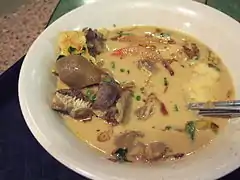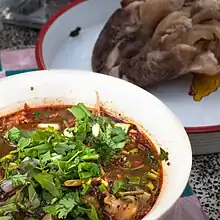Tendon as food
The tendons of certain animals (particularly beef tendon) are used as an ingredient in some Asian cuisines, including the Filipino, Chinese, Japanese, Korean, Indonesian, Thai, Laotian, Cambodian and Vietnamese traditions. Tendon is tough and fibrous, but becomes soft after a long period of cooking.[1] In some cases it may be boiled for as long as eight hours, while in other dishes it is prepared by deep frying.[1][2] It contains large amounts of collagen, and after boiling or stewing, it is sometimes described as mimicking the mouthfeel of high-fat cuts of beef despite its low fat content.[1] One author described the taste of deep-fried tendon as being similar to chicharrón (fried pork belly).[3]
Culinary uses
China
One popular Chinese dish is suànbào niújīn (蒜爆牛筋), where the tendon is marinated in garlic; it is often served at dim sum restaurants.[4]
Indonesia
In Indonesian cuisine, bakso urat is beef meatball filled with pieces of tendon, while soto kaki is spicy cow's trotters soup which includes cow's leg tendons. Another dish is mie kocok which is a noodle dish with meatballs, beansprouts and pieces of beef tendon.
Japan
In Japanese cuisine, beef tendon (gyū-suji) is a common ingredient in oden.[5]
Korea
In Korean cuisine, beef tendon is known as soesim (쇠심) and is eaten raw as hoe,[6] or stir-fried as namul; however, it is not very common. The most common way to eat beef tendon in Korea is steaming it with high pressure to serve it soft. The steamed beef tendons are eaten with green onions and soy sauce or sometimes served in ox bone soup.
Thailand
In Thai cuisine, tendon (เอ็น) is often added to noodle soup such as Guay tiew nuea toon.[7]
Vietnam
In Vietnamese cuisine, it is often used in pho.
Gallery
 Indonesian mie kocok noodle dish uses pieces of beef tendon.
Indonesian mie kocok noodle dish uses pieces of beef tendon. Indonesian soto kaki (tendon soup)
Indonesian soto kaki (tendon soup) Gyū-suji nikomi (牛筋煮込み), a Japanese dish made from stewed beef tendon
Gyū-suji nikomi (牛筋煮込み), a Japanese dish made from stewed beef tendon A northern Thai soup made from the hoof of the water buffalo, of which the tendons and the skin are eaten
A northern Thai soup made from the hoof of the water buffalo, of which the tendons and the skin are eaten
References
- O'Neil, Erica (11 August 2010). "Beef Tendon". Phoenix New Times. Retrieved 15 October 2015.
- "Hot food: Beef tendon". Sydney Morning Herald Good Food. 28 April 2015. Retrieved 15 October 2015.
- Lin, Eddie (6 March 2013). "Puff, Puff, Tendon: A Contemporary Crunch at Lukshon". Los Angeles Magazine. Retrieved 15 October 2015.
- "Braised Tendon with Scallions: Chinese Recipe". Chinatown Online. Retrieved 15 October 2015.
- "A hodgepodge that really hits the spot". Japan Times. 25 November 2001. Retrieved 15 October 2015.
- "Soesim" 쇠심. Standard Korean Language Dictionary (in Korean). National Institute of Korean Language. Retrieved 12 October 2017.
- Guay tiew nuea toon (steamed beef noodles) at Wattana Panich in Bangkok